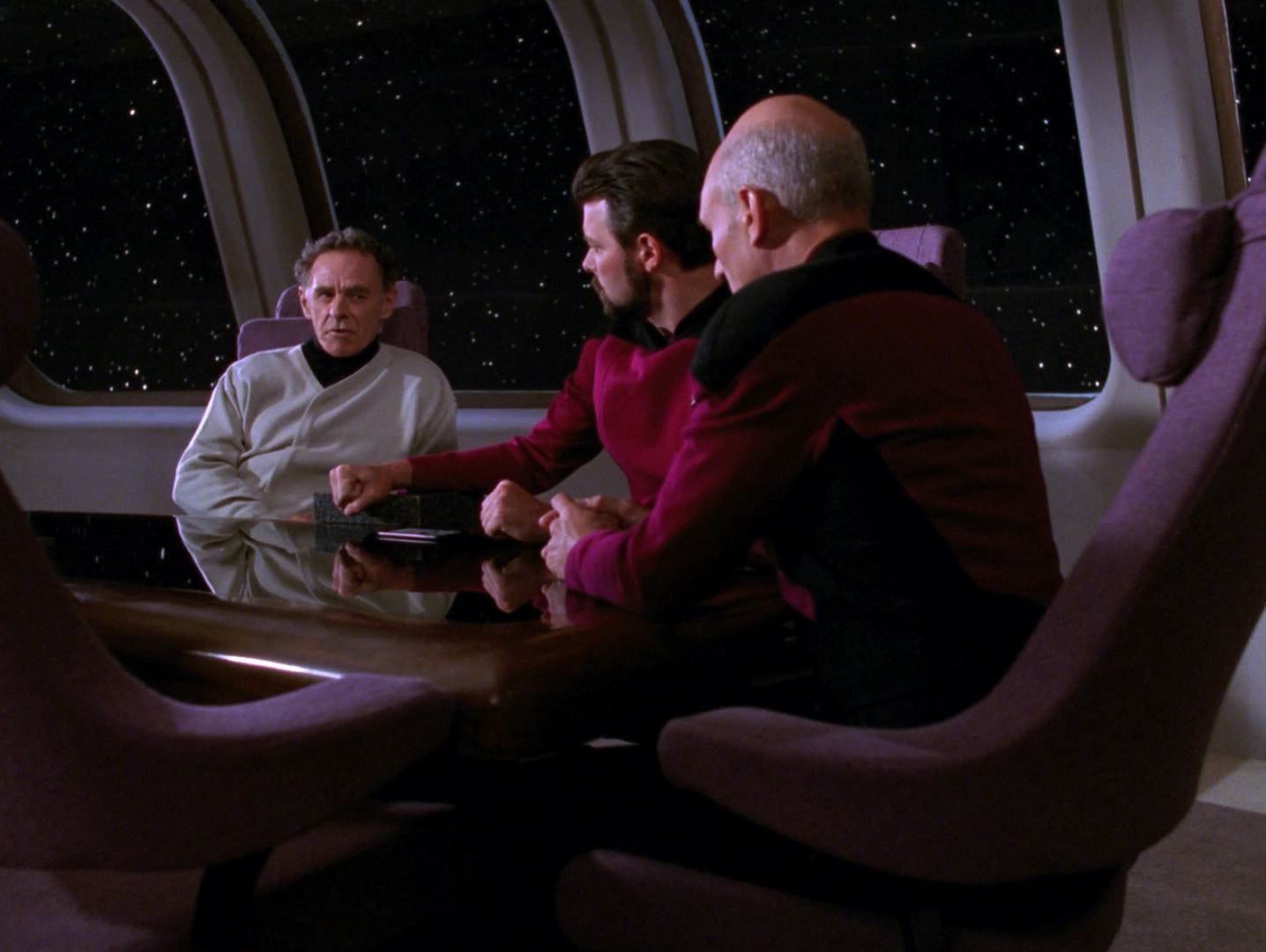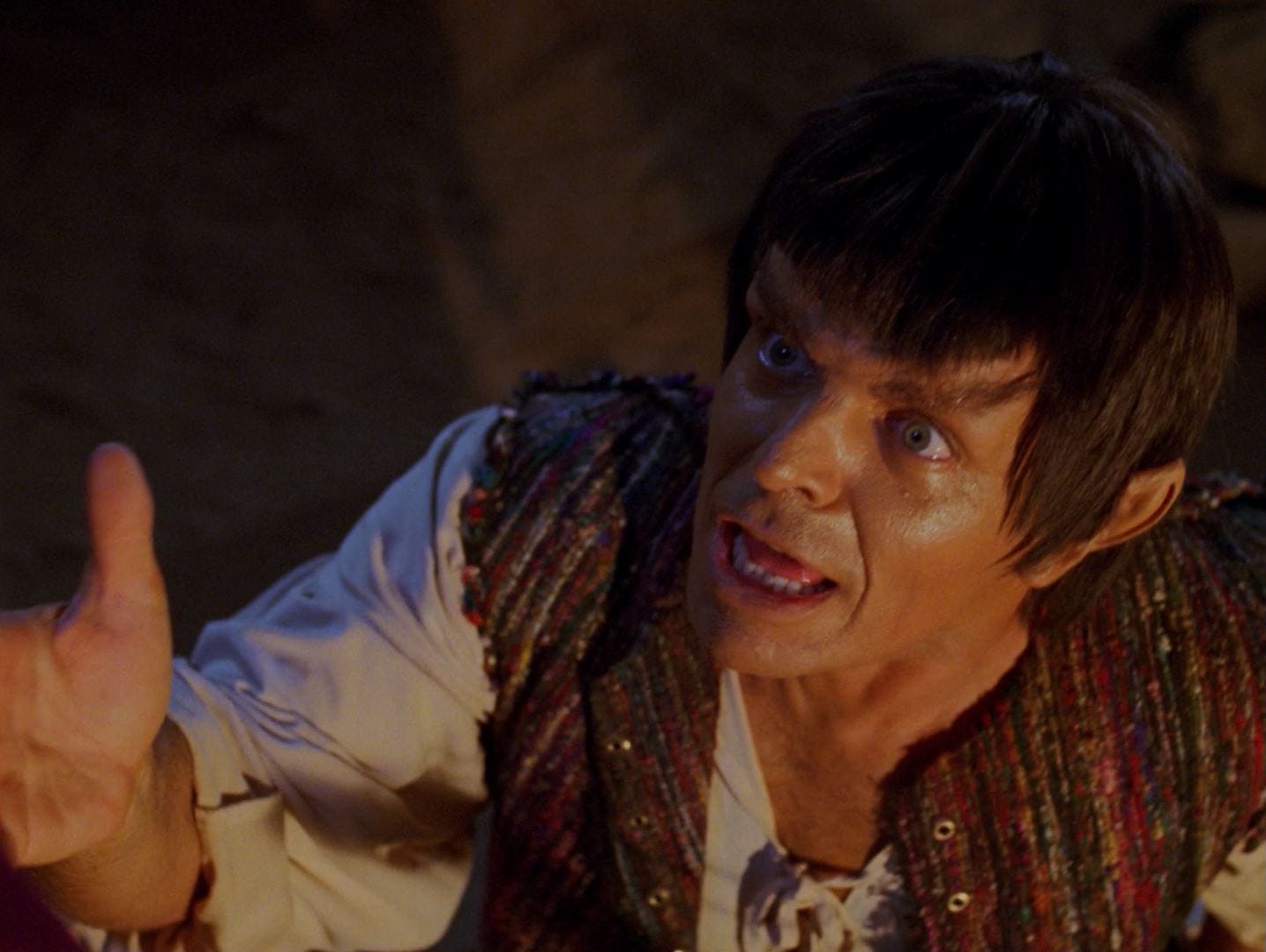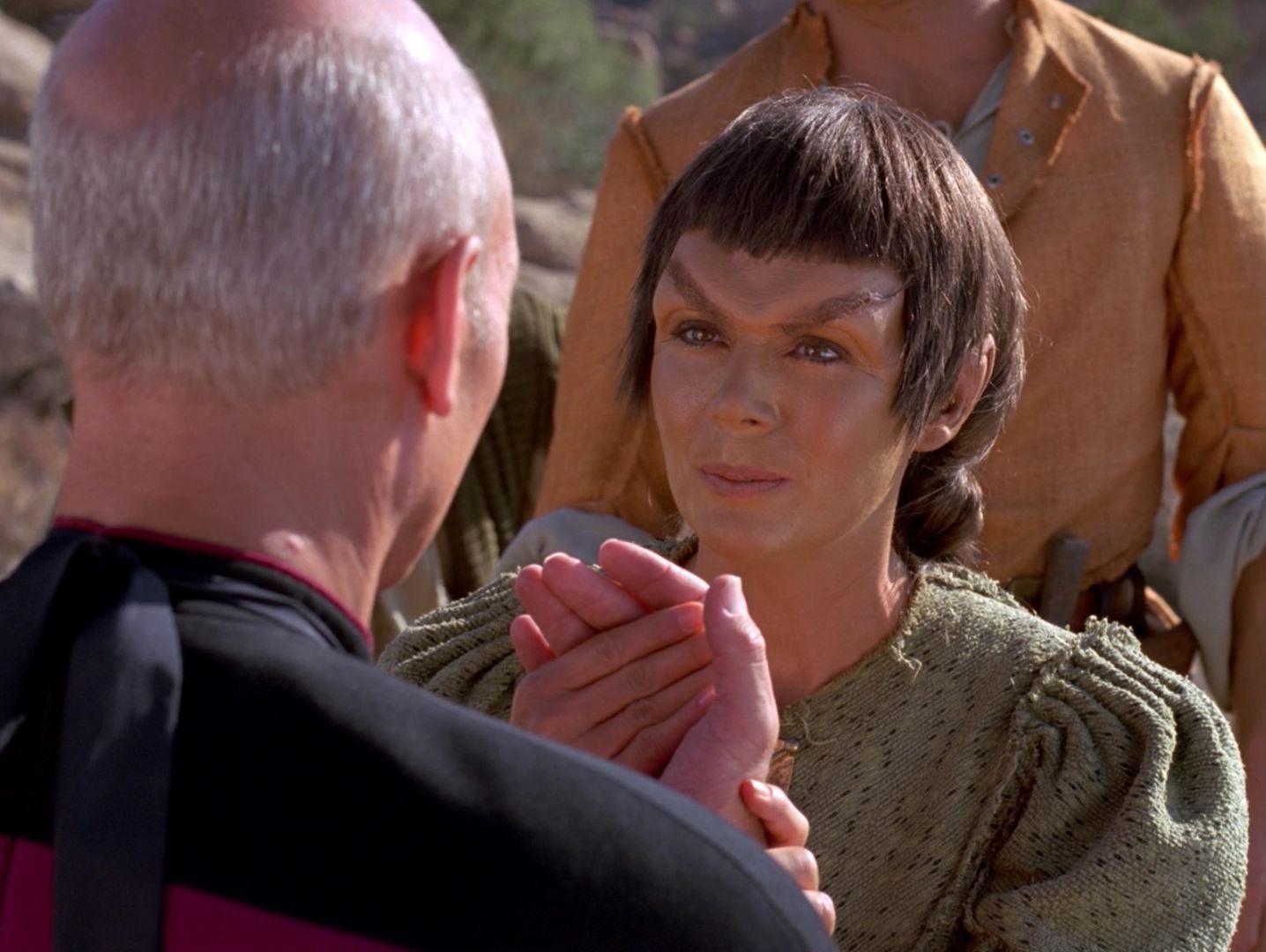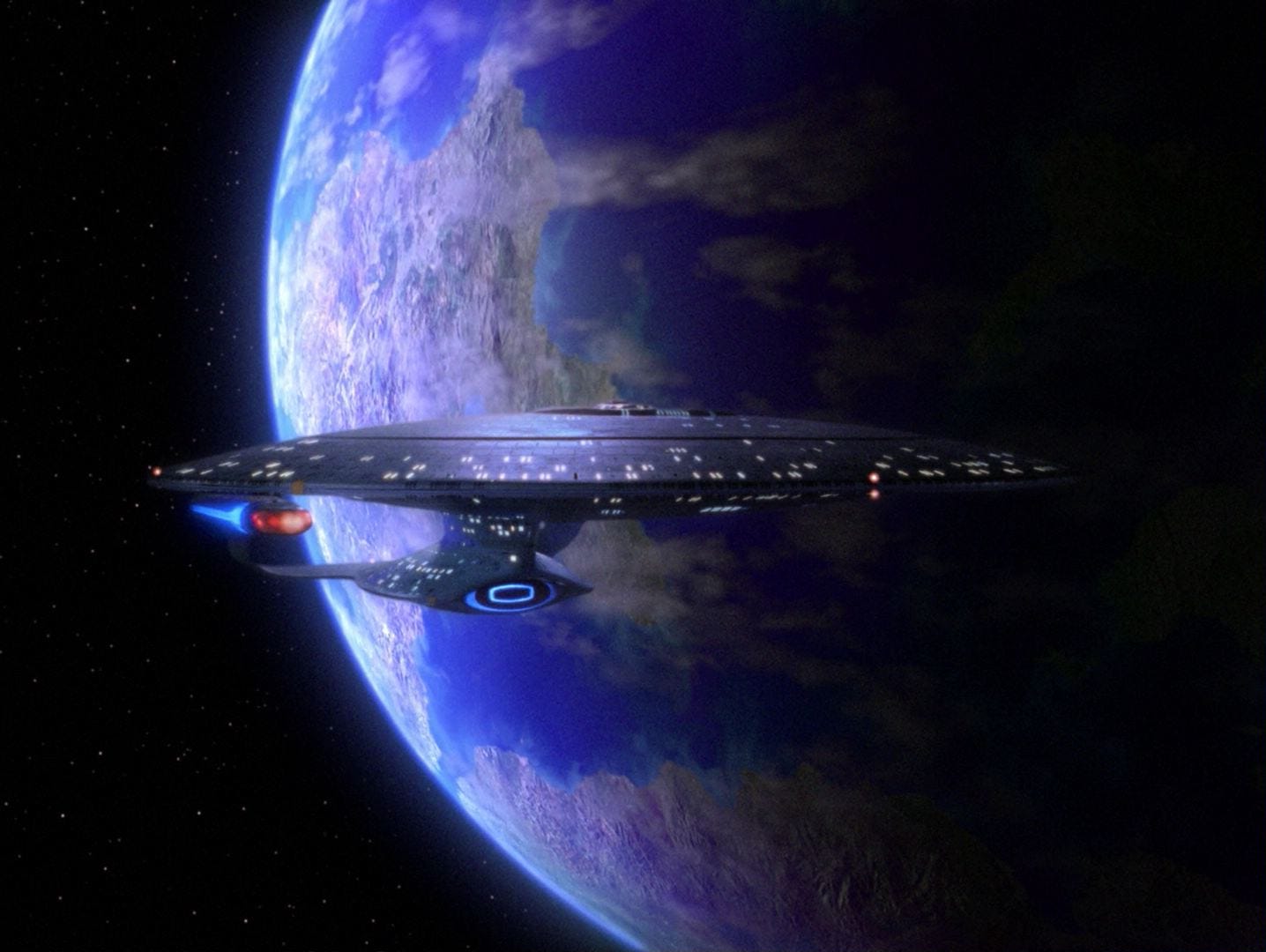Who Watches the Watchers
Nothing says 'good guys' quite like covertly spying on indigenous populations
The Enterprise is on its way to replace a power generator in a 'duck blind' being used to, well, spy on an indigenous population without their permission or knowledge. Because, you know, science. Their old generator explodes revealing the spying operation to the locals, one of who witnesses the covert operation and then electrocutes himself. So the Enterprise crew, not content with supporting all this nefarious voyeurism, sends Troi and Riker to the planet to lie to the population in person. Slippery slope? It's practically a ski jump on this premise!
Anyway, off we slide down the slippery slope until ultimately 'the Picard', who overnight has become god to the Mintakans, has to confront them and patronise their naivety and stupidity. Honestly, Picard should be apologising to everyone for the absolute pigs ear the Federation has made of everything, but no, they're far too advanced for that. Instead, he kidnaps one of the Mintakan women and gives her one of his trademark lectures, before beaming down to get himself shot with an arrow.
Frankly, it's more than he deserves at that point in the story.
Words
This is widely considered something of a classic, but I'm afraid I must respectfully deviate from popular opinion on this one. While my first experiences of this episode were positive, I have come to see it as a rather racist story (culturally racist, that is, not in the sense of skin-colour prejudice). Feel free to skip on to ‘Roles’ if you’re not interested in a bit of a ramble on ethics. Go on, I won’t know you did it.
The reason we won't tend to see it as bigoted is that we freely go along with the rhetoric of the screenplay - the notion of 'progress', the idea that the Mintakans are 'primitive' next to the Federation, the implication that high technology is both inevitable and desirable... everything about the ideological underpinnings of this story presupposes superiors and inferiors. True, it avoids advocating for outright colonialism - the Prime Directive is still very much in play here, and is one of the load-bearing concepts for the story. But Richard Manning and Hans Beimler's story is built upon presuppositions that today I find highly questionable.
The prejudice at work here is the presumption that the myths and legends of a pre-industrial culture are primarily an inferior prototype to scientific thinking, destined to be replaced by it. This is a doubly problematic perspective. Firstly, because the wisdom held in traditional stories is not primarily about explanation, but about conveying notions of virtue and instilling communal values. Secondly, seeing mythology as a precursor to scientific understanding risks misleading us about ourselves. For all our technical prowess, the mythology of technology we all live with today seems incapable of encoding the kinds of communal values that traditional stories conveyed, and may even blind us to them.
I really cannot read the following extract from the script and not see a deeply prejudicial understanding of human cultural beliefs based entirely upon a caricature of Christianity:
RIKER (to Barron): And you're saying that belief will eventually develop into a religion.
BARRON: It's inevitable. And without guidance, that religion could degenerate into inquisitions... holy wars... chaos.
The irony being, of course, that the same kind of grotesque cultural arrogance that provoked inquisitions and holy wars animates this script as well. And while I'm picking through the bones of this screenplay, can I point out that even if it was ethically permissible to spy on this planet, a holographically concealed satellite could do the same in a much less intrusive manner. Even this course of action, I now feel, would be more questionable than this episode wants us to believe.
I’m afraid I now find this episode’s ideological commitment to 'progress' really rather disturbing, but as ever your warp factor may vary. Counter arguments in the comments are extremely welcome!
Acting Roles
Ray Wise's Liko is a brilliant performance - he eats up the nonsense he’s been given to speak and delivers it with gusto. Almost single-handedly he sells us the ideology of the screenplay and we eat it up because he is so convincing in his rapid descent into superstition. Wise crops up again in Voyager, but this is a hard role to top.
Kathryn Leigh Scott's Nuria has a smaller role in the script, but she also performs well, even if her primary purpose in the story is to gobble up the dogma that Picard feeds her after her kidnapping. She's most well known for her recurring role in the gothic soap opera Dark Shadows, which is a cult classic to people of a certain age.
Pamela Segall's Oji, the young record keeper, doesn't give as strong a performance, but she supports the story reasonably well. She looks very much like a child actress too - but she was actually 23 years old when this episode was shot.
Segall's biggest recurring role might surprise you, though: she's the voice of Bobby Hill in the award-winning animated series King of the Hill.
Her married name is Pamela Adlon, incidentally, and she’s done more voice work than you could possibly imagine.
Models, Make-up, and Mattes
Does Mintaka III look familiar? It should do. It's none other than Vasquez Rocks Natural Area Park, a popular filming location for classic Trek - never more memorably than in "Arena", when Captain Picard duels with a Gorn.
A great deal of this episode is shot on location, and this show marks the beginning of the show's willingness to shoot more episodes out of the studio. Check out the production crew in this behind-the-scenes shot!
I get the impression they’re thrilled to be out of those stuffy sound stages, but they really are just minutes away from them.
I don't think much of the planetary matte created for this episode, although it looks much better in the remastered version. We'll see it again as the planet Betazed at the back end of season three.
No studio miniatures at all beyond stock footage of the Enterprise-D, alas, but the episode is a triumph for the set builders, who create both of the studio spaces the story depends upon: the interior of the 'duck blind' and the Mintakan village's Assembly Hall.
This episode brings to an end the brief tenure of Michael Wagner as showrunner, after a mere four episodes. It seems he couldn't get to grips with the intricacies of the production dynamics, since TNG was a show where every episode involved input and discussions with every conceivable aspect of putting the episodes together. The next episode begins the tenure of the person who along with Rick Berman will guide the Trek franchise all the way to the end of its original run.


















The Picard approves of Ray Wise in everything he does! 🖖